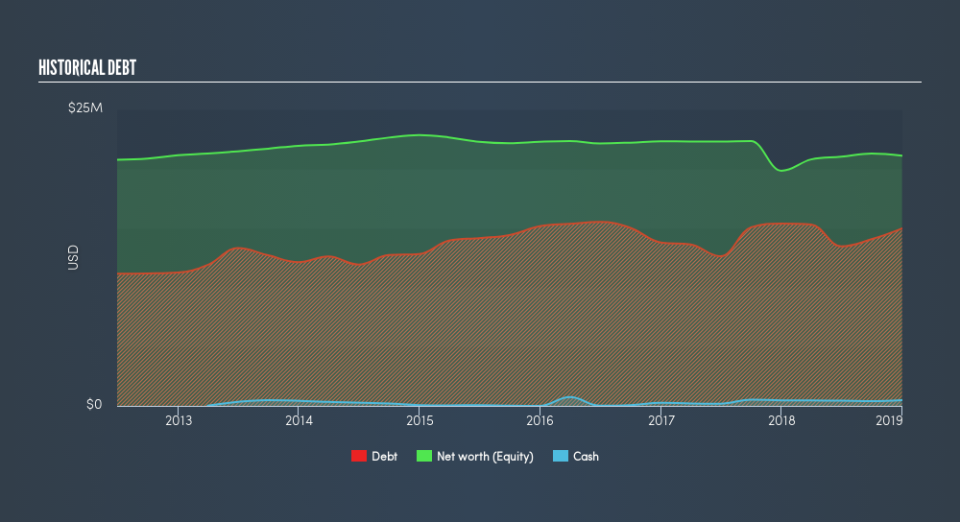You Might Like Nortech Systems Incorporated (NASDAQ:NSYS) But Do You Like Its Debt?

Want to participate in a short research study? Help shape the future of investing tools and you could win a $250 gift card!
Nortech Systems Incorporated (NASDAQ:NSYS) is a small-cap stock with a market capitalization of US$10m. While investors primarily focus on the growth potential and competitive landscape of the small-cap companies, they end up ignoring a key aspect, which could be the biggest threat to its existence: its financial health. Why is it important? Evaluating financial health as part of your investment thesis is essential, as mismanagement of capital can lead to bankruptcies, which occur at a higher rate for small-caps. We'll look at some basic checks that can form a snapshot the company’s financial strength. Nevertheless, this is not a comprehensive overview, so I suggest you dig deeper yourself into NSYS here.
NSYS’s Debt (And Cash Flows)
NSYS has sustained its debt level by about US$15m over the last 12 months which accounts for long term debt. At this stable level of debt, NSYS currently has US$480k remaining in cash and short-term investments , ready to be used for running the business. Additionally, NSYS has generated US$2.4m in operating cash flow over the same time period, leading to an operating cash to total debt ratio of 16%, indicating that NSYS’s operating cash is less than its debt.
Does NSYS’s liquid assets cover its short-term commitments?
At the current liabilities level of US$25m, it seems that the business has been able to meet these obligations given the level of current assets of US$46m, with a current ratio of 1.84x. The current ratio is calculated by dividing current assets by current liabilities. Generally, for Electronic companies, this is a reasonable ratio since there's a sufficient cash cushion without leaving too much capital idle or in low-earning investments.
Can NSYS service its debt comfortably?
With a debt-to-equity ratio of 71%, NSYS can be considered as an above-average leveraged company. This is somewhat unusual for small-caps companies, since lenders are often hesitant to provide attractive interest rates to less-established businesses. We can test if NSYS’s debt levels are sustainable by measuring interest payments against earnings of a company. Ideally, earnings before interest and tax (EBIT) should cover net interest by at least three times. For NSYS, the ratio of 1.65x suggests that interest is not strongly covered, which means that lenders may refuse to lend the company more money, as it is seen as too risky in terms of default.
Next Steps:
Although NSYS’s debt level is towards the higher end of the spectrum, its cash flow coverage seems adequate to meet obligations which means its debt is being efficiently utilised. This may mean this is an optimal capital structure for the business, given that it is also meeting its short-term commitment. This is only a rough assessment of financial health, and I'm sure NSYS has company-specific issues impacting its capital structure decisions. I suggest you continue to research Nortech Systems to get a better picture of the small-cap by looking at:
Valuation: What is NSYS worth today? Is the stock undervalued, even when its growth outlook is factored into its intrinsic value? The intrinsic value infographic in our free research report helps visualize whether NSYS is currently mispriced by the market.
Historical Performance: What has NSYS's returns been like over the past? Go into more detail in the past track record analysis and take a look at the free visual representations of our analysis for more clarity.
Other High-Performing Stocks: Are there other stocks that provide better prospects with proven track records? Explore our free list of these great stocks here.
We aim to bring you long-term focused research analysis driven by fundamental data. Note that our analysis may not factor in the latest price-sensitive company announcements or qualitative material.
If you spot an error that warrants correction, please contact the editor at editorial-team@simplywallst.com. This article by Simply Wall St is general in nature. It does not constitute a recommendation to buy or sell any stock, and does not take account of your objectives, or your financial situation. Simply Wall St has no position in the stocks mentioned. Thank you for reading.

